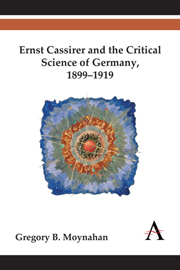Book contents
- Frontmatter
- Dedication
- Contents
- Acknowledgments
- List of Abbreviations
- Introduction “Reading a Mute History”: Ernst Cassirer, the Marburg School and the Crises of Modern Germany
- Part I The Marburg School and the Politics of Science in Germany
- Part II Critical Science and Modernity
- Part III Liberal Democracy and Law
- Chapter Six Liberalism and the Conflict of Forms: The Knowledge Problem (1906–1940) and Freedom and Form (1916)
- Chapter Seven Law as Science and the “Coming-into-Being” of Natural Right in Cohen, Cassirer and Kelsen
- Conclusion Critical Science, the Future of Humanity and the Riddle of An Essay on Man (1944)
- Index
Chapter Seven - Law as Science and the “Coming-into-Being” of Natural Right in Cohen, Cassirer and Kelsen
from Part III - Liberal Democracy and Law
Published online by Cambridge University Press: 05 September 2013
- Frontmatter
- Dedication
- Contents
- Acknowledgments
- List of Abbreviations
- Introduction “Reading a Mute History”: Ernst Cassirer, the Marburg School and the Crises of Modern Germany
- Part I The Marburg School and the Politics of Science in Germany
- Part II Critical Science and Modernity
- Part III Liberal Democracy and Law
- Chapter Six Liberalism and the Conflict of Forms: The Knowledge Problem (1906–1940) and Freedom and Form (1916)
- Chapter Seven Law as Science and the “Coming-into-Being” of Natural Right in Cohen, Cassirer and Kelsen
- Conclusion Critical Science, the Future of Humanity and the Riddle of An Essay on Man (1944)
- Index
Summary
In an overview of Ernst Cassirer's Weimar career, the philosopher Jürgen Habermas commented on a central contradiction. “In the realm of the German Mandarins, [Cassirer was] one of the few courageous exceptions who defended the Weimar Republic against its despisers among the intellectuals,” yet it is “all the more astonishing” that nowhere in Cassirer's key writings on symbolic forms from the Weimar Period does the concept of right and morality, and with it the realm of politics, find a clearly defined place. In this, Habermas voices a disappointment common to many readers of Cassirer: even as Cassirer was clearly aware of the perils of his era, his Weimar philosophy appears to have retained a “Mandarin” distance from politics. Habermas responds to this lacuna by noting the continuity and importance of Cassirer's concept of symbolic form with a “theory of civilizational processes,” an argument that has been developed from a different perspective in Drucilla Cornell's recent work on Cassirer. As we have already suggested from Cassirer's work in the Wilhelmine period, however, he had earlier presented the outlines of a surprisingly robust theory of law and the state that greatly strengthens Habermas's reading of Cassirer. Indeed, Cassirer's theory of law, ethics and his liberal theory of something resembling “civilizational processes” prove integrally related to his later work, and only by placing these aspects of his project together can we understand the political meaning of his philosophy.
- Type
- Chapter
- Information
- Ernst Cassirer and the Critical Science of Germany, 1899-1919 , pp. 193 - 208Publisher: Anthem PressPrint publication year: 2013

